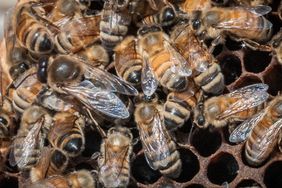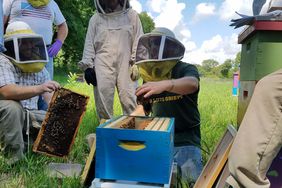:max_bytes(150000):strip_icc()/USDA20Butterfly-2-2000-193e89f9fb7d4ddcb2cc58626dc1a0a6.jpg)
The migratory monarch butterfly has been categorized as "endangered" by the International Union for the Conservation of Nature (IUCN), joining its "Red List" of threatened species.
The migratory monarch butterfly is a subspecies of the monarch butterfly, known for its migrations from Mexico and California in the winter to summer breeding grounds throughout the United States and Canada. According to the IUCN, the species' population has shrunk by between 22-72% over the last decade.
READ MORE: PLANNING FOR POLLINATORS
The western population is at the greatest risk of extinction, declining by an estimated 99.9% between the 1980s and 2021 — this is a drop from as many as 10 million butterflies to just 1,914. The larger eastern population has shrunk by 84% from 1996 to 2014. There is concern whether enough butterflies survive to maintain populations and prevent extinction.
"It is difficult to watch monarch butterflies and their extraordinary migration teeter on the edge of collapse, but there are signs of hope," says Anna Walker, member of the IUCN SSC Butterfly and Moth Specialist Group, and species survival officer at the New Mexico BioPark Society, who led the monarch butterfly assessment. "So many people and organizations have come together to try and protect this butterfly and its habitats. From planting native milkweed and reducing pesticide use, to supporting the protection of overwintering sites and contributing to community science, we all have a role to play in making sure this iconic insect makes a full recovery."
READ MORE: U.S. CREATES POLLINATOR CONSERVATION CENTER
The IUCN cites logging and deforestation for urban development and agriculture as destroying substantial areas of the butterflies' winter shelter in Mexico and Canada. Pesticides and herbicides used in intensive agriculture across its migratory path have killed monarch butterflies and the milkweed their larvae feed on.
The USDA's Natural Resources Conservation Service (NRCS) says milkweed not only provides food for monarch butterflies, but it also produces high quality nectar that supports other pollinators like honey bees, which are vital to agriculture. Milkweed also can provide a home for beneficial insects that control destructive insects.
Climate change has also significantly impacted the monarch butterfly, and is a fast-growing threat, according to the IUCN. Drought limits the growth of milkweed and increases the frequency of wildfires. Higher temperatures can also trigger earlier migrations before milkweed is available, and severe weather has killed millions of butterflies.
READ MORE: BECOME BEE FRIENDLY FARMING CERTIFIED
Monarch butterflies act as an "indicator species" that can show when there is something wrong in the environment, according to the National Wildlife Federation. It says the decline in monarch butterfly population could be an indication of trouble facing all pollinators. According to the USDA, 35% of the world's food crops depend on pollinators to reproduce.
The U.S. Fish and Wildlife Service (USFWS) recently announced it will establish a Pollinator Conservation Center focusing on species like the monarch butterfly. Interior Secretary Deb Haaland said the decline in butterfly populations was cause for alarm and would require collaborative action to reverse.
The USFWS does not yet list the monarch butterfly as an endangered species, and has it currently listed as a candidate.
:max_bytes(150000):strip_icc()/_D3_6951-2b36bbe5727444fb9b3b968da4e62f78.jpg)









